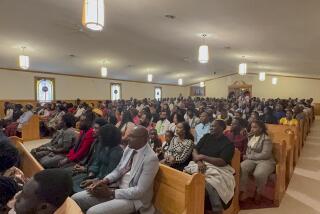Mississippi Delta: Third World Poverty in America’s Heartland
- Share via
SHARKEY COUNTY, Miss. — Willie Mae Watson lives with her six children and 11 grandchildren in a four-room shanty without plumbing or even an outhouse. It is little more than plywood walls and a torn tin roof.
Not far away, 22-year-old Flora Knight is struggling to earn a high school diploma while rearing her six children--ages 7, 6, 5, 3, 2 and 4 months.
“They don’t have too good a chance,” she said of the youngsters. “I don’t think they’ll have a job waiting here for them, even if they go to school and finish.”
The mighty river and loamy soil of the Mississippi Delta, from downstate Illinois to Louisiana’s Gulf Coast, form one of the world’s most bountiful basins. It is land that produces agricultural treasures for the rest of the world.
Why, then, does this place Mark Twain called “the body of the nation” not support its own children?
Why does this area have a larger proportion of its people living in extreme poverty than Appalachia? Why do the rich cargoes of the river’s barges and tankers pass these children by?
The Delta ranks below some Third World countries in its infant mortality rate. Unemployment runs 60% above the nationwide average and income per person, at $10,192 a year, is 25% less. It is a region that is little noticed by most Americans.
The Delta, which gave birth to the blues, has seen decades of racism, economic failure and indifference, according to a federal commission that has studied the region and its 8 million people for 18 months.
Monday members of the Lower Mississippi Delta Development Commission will recommend to Congress how to stimulate growth in the area, which runs through Illinois, Missouri, Kentucky, Tennessee, Arkansas and Louisiana and Mississippi.
But forging a better future for the 3 million children of the Delta will take more than suggestions in a report.
“This ain’t no good place to grow up, but we try our best,” said Mavis Watson, one of the 18 inhabitants of the shack on the Panther Burn Plantation here.
Although the states have made a concerted effort to improve Delta schools, a pattern of poor education scares off businesses that might bring jobs to the area. Too many people fail to take advantage of the meager medical care available, and environmental pollution compounds public health problems.
Agriculture remains the dominant industry, but farm jobs have been lost to mechanization. Many of the poor here (most are black) can find only minimum-wage labor at harvest time. Most work so rarely that they cannot draw unemployment benefits.
“I hear people say nothing good ever going to happen here,” said Bubba Sullivan, who runs an eclectic blues record store in Helena, Ark. “If you don’t have industry, you don’t have a middle class, you can’t blame kids on welfare.”
Unskilled, uneducated and without savings, the adults cannot find a way to a better life and their children often face a future as bleak as the past.
School dropout, pregnancy and unemployment rates among teen-agers here are some of the worst in the nation. Babies born in some Delta counties are less likely to survive than infants in French Guiana or Malaysia. Tunica County, in Mississippi, has been called “America’s Ethiopia.”
The people matter-of-factly tell horror stories: A 10-year-old boy burning scraps of paper in his house to keep warm; a child saved by $100,000 worth of medical treatment in a university hospital only to return home to a shack and die of rat bites.
The 1980 census found that more than a third of all households lacked indoor plumbing or central heating. Although federal programs have replaced some shacks, crumbling houses are still a common sight.
Potential leaders and role models--the people with grit and drive--usually move away. Those who earn college degrees or learn skills can’t find jobs that pay well, so they go elsewhere.
Louisiana, for example, once kept 70% of the doctors it educated and trained. Now only 30% of them stay, Greg Bowser of the Louisiana Health Care Authority said.
“Our biggest export? People,” said Stan Hyland, a Memphis State University anthropologist who works with the commission.
Welfare payments through Aid to Families with Dependent Children in 1986 totaled almost $340 million in the 214 counties of the Delta region. That was only a fraction of the government transfer payments to the poor people of the Delta. They amounted to almost $2 billion, excluding Medicare and Medicaid.
Even with so much aid, the most basic want still can be found in countless tiny towns and clusters of workers’ houses on the farms.
“When you’re getting children ready to go to school and they don’t have the proper clothes to put on, and they’re old enough to know that this is not the way they’re supposed to go to school . . . . We’ve found that that is causing a lot of our dropouts,” said the Rev. Bertha Thurman of Belzoni, Miss. “They’re ashamed.”
Thurman is rearing a 16-year-old foster daughter and the daughter’s 2-year-old son on food stamps and money she earns cleaning houses.
“You’ve just got to have a heart full of love, and you can’t buy groceries with it, either,” she said. “Make you pray a whole lot!”
At the northern end of the Delta region, Cairo, Ill., businesswoman Helen Bishoff sees children similarly disadvantaged.
“There’s nothing as an alternative to drinking and drugs and standing around on street corners and sitting on hoods of cars. We do not have a movie theater. There’s no teen center,” said Bishoff, who is pushing to get a center built.
“There’s no enrichment for these children,” she said, “nothing to show them the world beyond.”
Rims Barber, who has worked with the poor in Mississippi since 1964, said that for many Delta youngsters, “life is only something that happens to them. They’re only passive players.
“Ask me what I might do tonight; I can handle that. Ask me what I might do when I grow up; I can’t handle that.”
Annie Brown is working to change things, but has found that people here aren’t always eager for change.
The daughter of a sharecropper, she runs a literacy program in Rolling Fork, Miss., that she started in 1985 with classes around a card table in her funeral home. Since then, 27 adults have earned high school diplomas.
“Illiteracy is a poisonous disease to our children,” said Brown, who thunders with a preacher’s fiery passion in describing how whites fought her efforts because they feared losing their cooks, maids and farmhands.
“Here you have to push, you have to demand, you have to say, ‘This is what we are going to do,’ ” she said. “I get knocked down sometimes, but I bounce back like a rubber ball.”
Blacks and whites in the Delta agree that leaders in the past were reluctant to diversify the agricultural economy that so enriched its owners. Development lagged, river ports lost business and the area fell further and further behind.
If progress is to be made, attitudes must change--especially the “plantation orientation” that lingers from the days of slave labor, said Emma Cooper-Harris, who runs a community development organization in Rolling Fork.
“This goes way back, beyond what the eye can see,” she said.
“My daddy is illiterate, but he had visions for his children. He’d often tell us--and give us a paddling if he thought that we weren’t doing what we were supposed to have done in school--’I want you to grow up and be somebody. I don’t want you to have to work on this farm like I have ever since I was 8 years old.’ He had visions for us.
“You’ve got teen parents in the 10th grade--and their children are in kindergarten! We have sixth and seventh-graders that have had abortions. I’m empty when I talk about it.”
Martha Ann Michael, a mother prodding her three children to study in their 15-by-30-foot shack outside Cary, Miss., tries her best to preach the value of education.
“My baby,” she said of her 6-year-old daughter. “She’s an honor roll student.”
The family survives on food stamps and $144 a month in welfare. Their name is on a long waiting list for public housing.
When there’s work at a local cotton gin, the mother pays off backlogged bills and tries to set aside something for small Christmas or birthday presents.
How would she change things?
“My children would have everything they wanted,” she said.
“And what do I want? I want me a job.”
More to Read
Sign up for Essential California
The most important California stories and recommendations in your inbox every morning.
You may occasionally receive promotional content from the Los Angeles Times.










